E-commerce Through a Sociological Lens: Benefits, Limitations Explored
VerifiedAdded on 2023/04/11
|5
|920
|500
Essay
AI Summary
This essay examines the benefits and limitations of online shopping through a sociological lens. It highlights the advantages, such as increased convenience and diversification, driven by technological advancements and changing consumer attitudes, particularly in Asian markets. However, it also addresses limitations, including customer expectations influenced by prior experiences and misleading references, as well as unequal access to e-commerce expertise due to social constraints and imbalanced resource allocation, drawing on Bourdieu's theory. The essay concludes that while e-commerce has seen considerable success, sociocultural factors can limit its prospects, emphasizing the importance of consistent service across all areas of an e-business. Desklib provides access to similar essays and study resources for students.
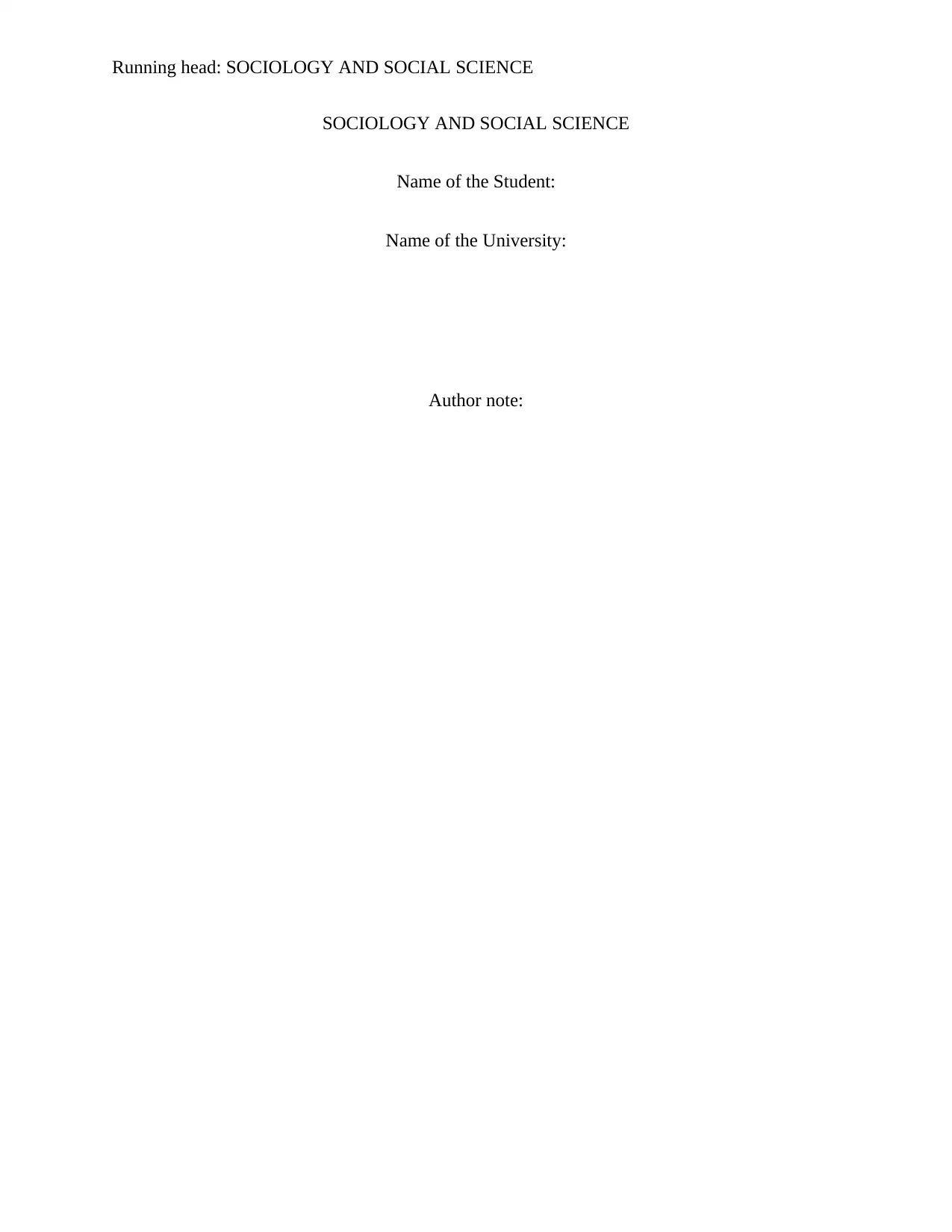
Running head: SOCIOLOGY AND SOCIAL SCIENCE
SOCIOLOGY AND SOCIAL SCIENCE
Name of the Student:
Name of the University:
Author note:
SOCIOLOGY AND SOCIAL SCIENCE
Name of the Student:
Name of the University:
Author note:
Paraphrase This Document
Need a fresh take? Get an instant paraphrase of this document with our AI Paraphraser
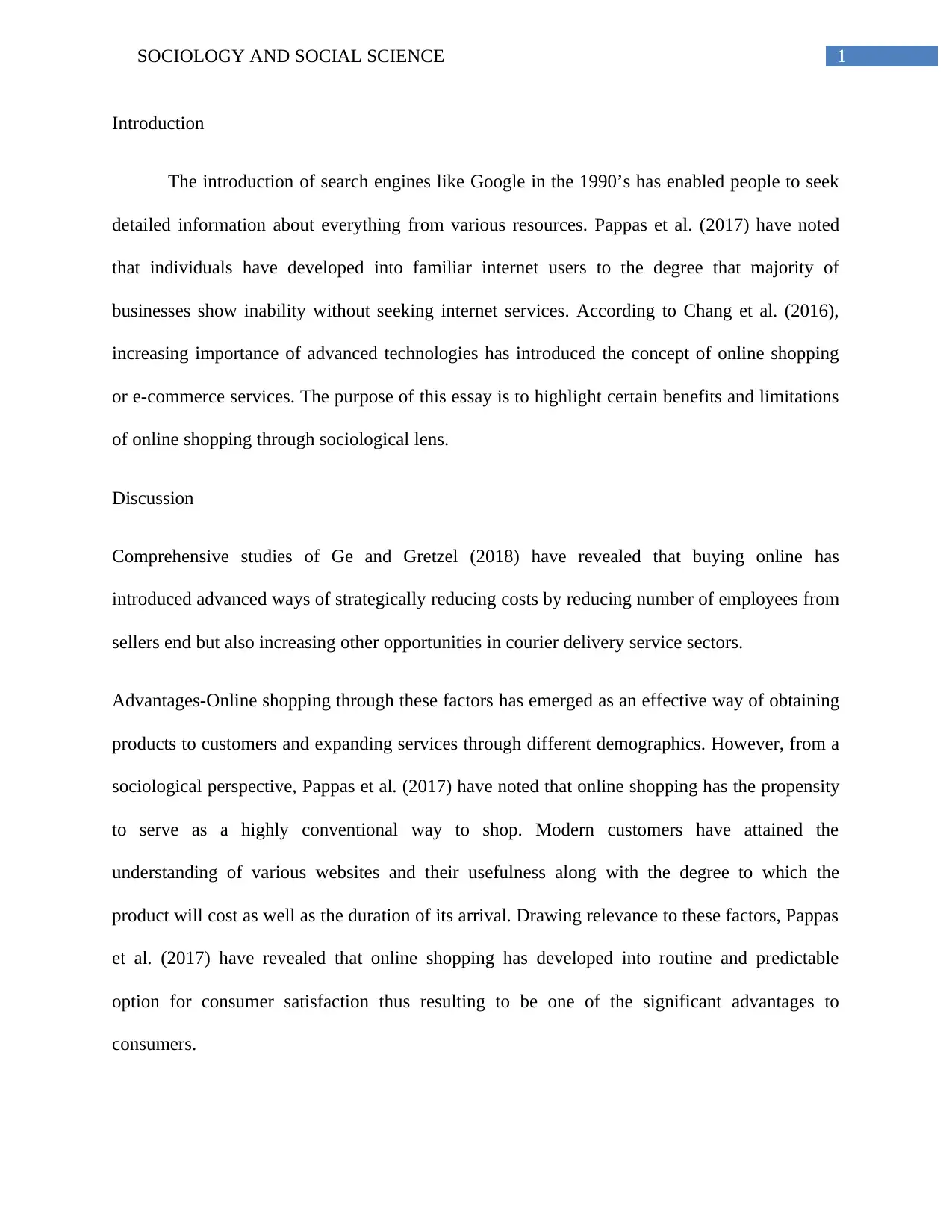
1SOCIOLOGY AND SOCIAL SCIENCE
Introduction
The introduction of search engines like Google in the 1990’s has enabled people to seek
detailed information about everything from various resources. Pappas et al. (2017) have noted
that individuals have developed into familiar internet users to the degree that majority of
businesses show inability without seeking internet services. According to Chang et al. (2016),
increasing importance of advanced technologies has introduced the concept of online shopping
or e-commerce services. The purpose of this essay is to highlight certain benefits and limitations
of online shopping through sociological lens.
Discussion
Comprehensive studies of Ge and Gretzel (2018) have revealed that buying online has
introduced advanced ways of strategically reducing costs by reducing number of employees from
sellers end but also increasing other opportunities in courier delivery service sectors.
Advantages-Online shopping through these factors has emerged as an effective way of obtaining
products to customers and expanding services through different demographics. However, from a
sociological perspective, Pappas et al. (2017) have noted that online shopping has the propensity
to serve as a highly conventional way to shop. Modern customers have attained the
understanding of various websites and their usefulness along with the degree to which the
product will cost as well as the duration of its arrival. Drawing relevance to these factors, Pappas
et al. (2017) have revealed that online shopping has developed into routine and predictable
option for consumer satisfaction thus resulting to be one of the significant advantages to
consumers.
Introduction
The introduction of search engines like Google in the 1990’s has enabled people to seek
detailed information about everything from various resources. Pappas et al. (2017) have noted
that individuals have developed into familiar internet users to the degree that majority of
businesses show inability without seeking internet services. According to Chang et al. (2016),
increasing importance of advanced technologies has introduced the concept of online shopping
or e-commerce services. The purpose of this essay is to highlight certain benefits and limitations
of online shopping through sociological lens.
Discussion
Comprehensive studies of Ge and Gretzel (2018) have revealed that buying online has
introduced advanced ways of strategically reducing costs by reducing number of employees from
sellers end but also increasing other opportunities in courier delivery service sectors.
Advantages-Online shopping through these factors has emerged as an effective way of obtaining
products to customers and expanding services through different demographics. However, from a
sociological perspective, Pappas et al. (2017) have noted that online shopping has the propensity
to serve as a highly conventional way to shop. Modern customers have attained the
understanding of various websites and their usefulness along with the degree to which the
product will cost as well as the duration of its arrival. Drawing relevance to these factors, Pappas
et al. (2017) have revealed that online shopping has developed into routine and predictable
option for consumer satisfaction thus resulting to be one of the significant advantages to
consumers.
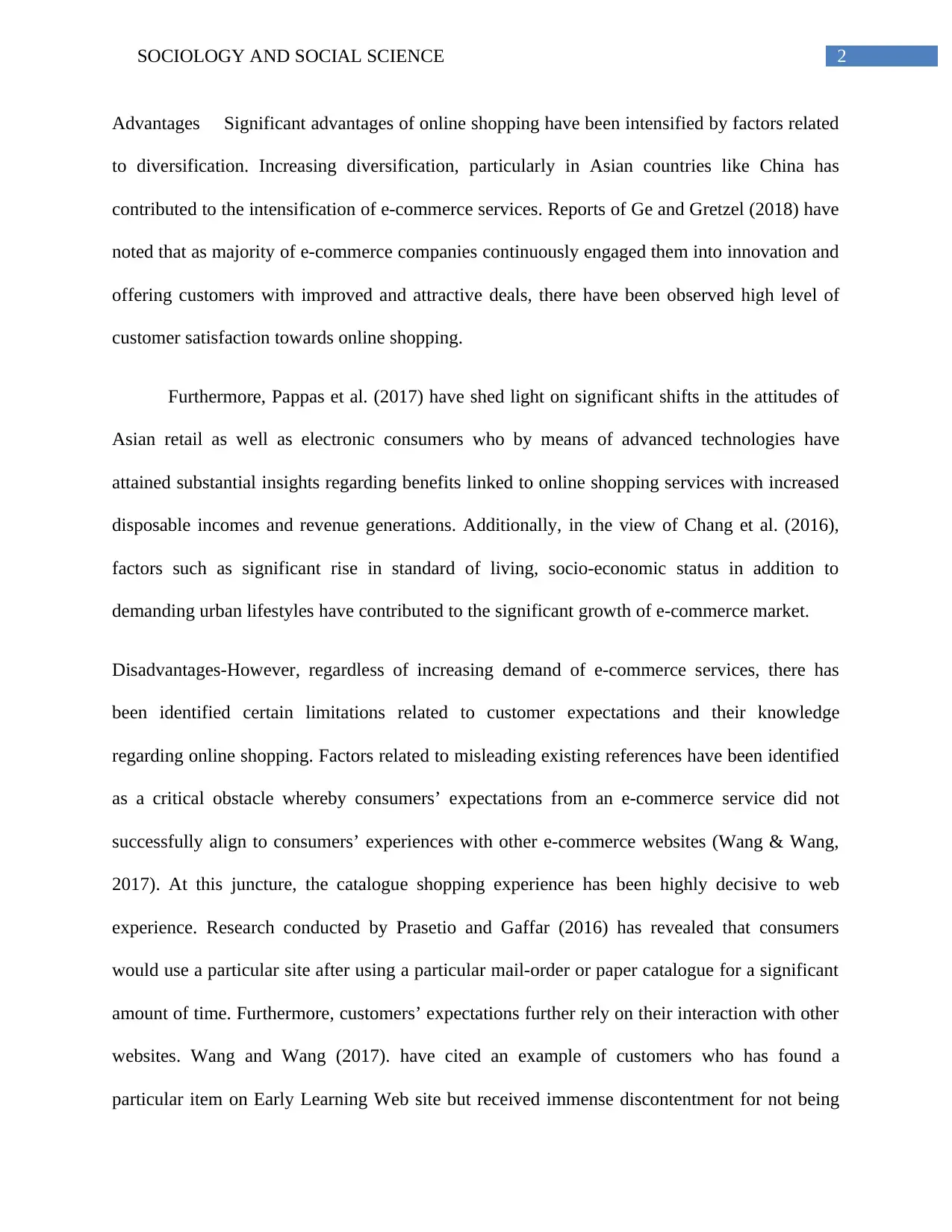
2SOCIOLOGY AND SOCIAL SCIENCE
Advantages Significant advantages of online shopping have been intensified by factors related
to diversification. Increasing diversification, particularly in Asian countries like China has
contributed to the intensification of e-commerce services. Reports of Ge and Gretzel (2018) have
noted that as majority of e-commerce companies continuously engaged them into innovation and
offering customers with improved and attractive deals, there have been observed high level of
customer satisfaction towards online shopping.
Furthermore, Pappas et al. (2017) have shed light on significant shifts in the attitudes of
Asian retail as well as electronic consumers who by means of advanced technologies have
attained substantial insights regarding benefits linked to online shopping services with increased
disposable incomes and revenue generations. Additionally, in the view of Chang et al. (2016),
factors such as significant rise in standard of living, socio-economic status in addition to
demanding urban lifestyles have contributed to the significant growth of e-commerce market.
Disadvantages-However, regardless of increasing demand of e-commerce services, there has
been identified certain limitations related to customer expectations and their knowledge
regarding online shopping. Factors related to misleading existing references have been identified
as a critical obstacle whereby consumers’ expectations from an e-commerce service did not
successfully align to consumers’ experiences with other e-commerce websites (Wang & Wang,
2017). At this juncture, the catalogue shopping experience has been highly decisive to web
experience. Research conducted by Prasetio and Gaffar (2016) has revealed that consumers
would use a particular site after using a particular mail-order or paper catalogue for a significant
amount of time. Furthermore, customers’ expectations further rely on their interaction with other
websites. Wang and Wang (2017). have cited an example of customers who has found a
particular item on Early Learning Web site but received immense discontentment for not being
Advantages Significant advantages of online shopping have been intensified by factors related
to diversification. Increasing diversification, particularly in Asian countries like China has
contributed to the intensification of e-commerce services. Reports of Ge and Gretzel (2018) have
noted that as majority of e-commerce companies continuously engaged them into innovation and
offering customers with improved and attractive deals, there have been observed high level of
customer satisfaction towards online shopping.
Furthermore, Pappas et al. (2017) have shed light on significant shifts in the attitudes of
Asian retail as well as electronic consumers who by means of advanced technologies have
attained substantial insights regarding benefits linked to online shopping services with increased
disposable incomes and revenue generations. Additionally, in the view of Chang et al. (2016),
factors such as significant rise in standard of living, socio-economic status in addition to
demanding urban lifestyles have contributed to the significant growth of e-commerce market.
Disadvantages-However, regardless of increasing demand of e-commerce services, there has
been identified certain limitations related to customer expectations and their knowledge
regarding online shopping. Factors related to misleading existing references have been identified
as a critical obstacle whereby consumers’ expectations from an e-commerce service did not
successfully align to consumers’ experiences with other e-commerce websites (Wang & Wang,
2017). At this juncture, the catalogue shopping experience has been highly decisive to web
experience. Research conducted by Prasetio and Gaffar (2016) has revealed that consumers
would use a particular site after using a particular mail-order or paper catalogue for a significant
amount of time. Furthermore, customers’ expectations further rely on their interaction with other
websites. Wang and Wang (2017). have cited an example of customers who has found a
particular item on Early Learning Web site but received immense discontentment for not being
⊘ This is a preview!⊘
Do you want full access?
Subscribe today to unlock all pages.

Trusted by 1+ million students worldwide
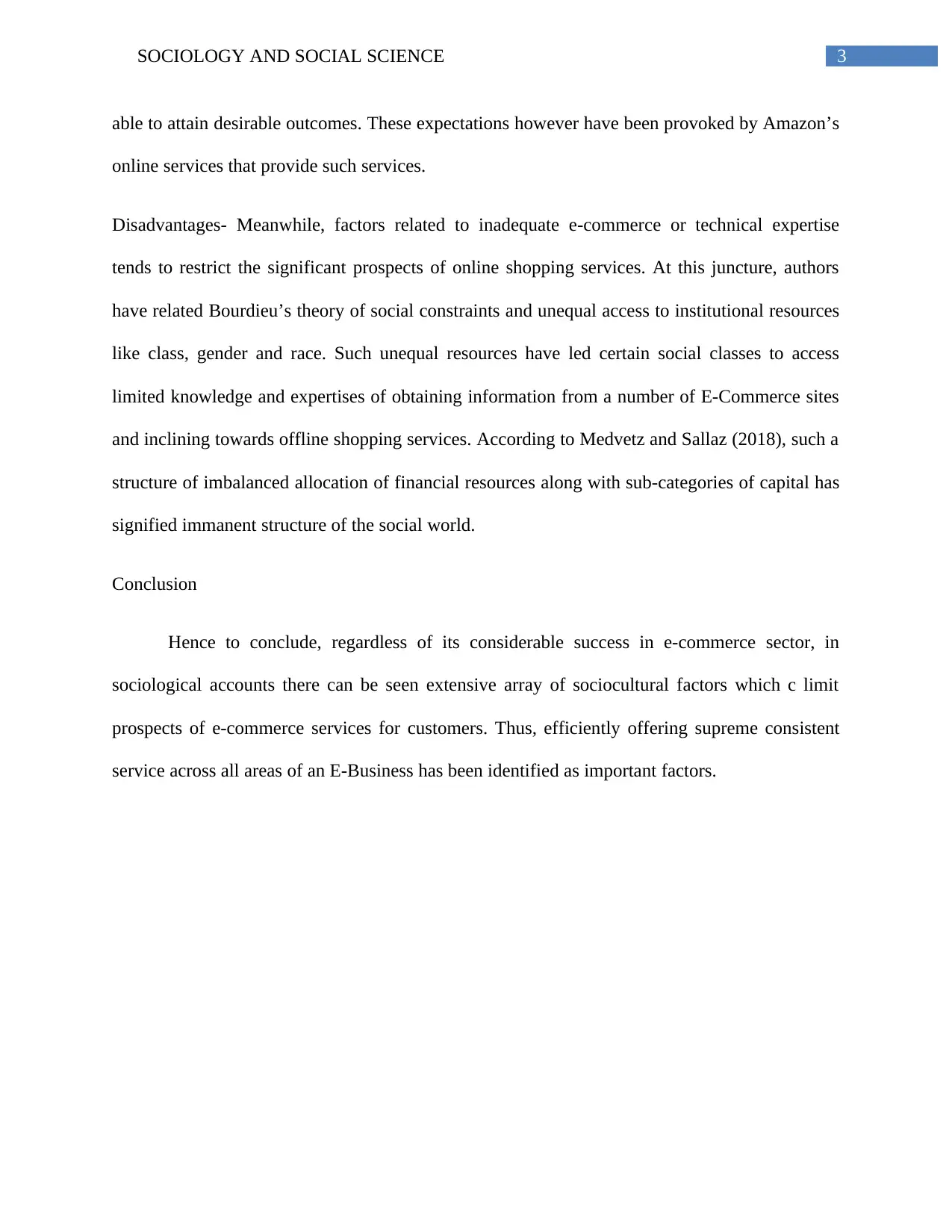
3SOCIOLOGY AND SOCIAL SCIENCE
able to attain desirable outcomes. These expectations however have been provoked by Amazon’s
online services that provide such services.
Disadvantages- Meanwhile, factors related to inadequate e-commerce or technical expertise
tends to restrict the significant prospects of online shopping services. At this juncture, authors
have related Bourdieu’s theory of social constraints and unequal access to institutional resources
like class, gender and race. Such unequal resources have led certain social classes to access
limited knowledge and expertises of obtaining information from a number of E-Commerce sites
and inclining towards offline shopping services. According to Medvetz and Sallaz (2018), such a
structure of imbalanced allocation of financial resources along with sub-categories of capital has
signified immanent structure of the social world.
Conclusion
Hence to conclude, regardless of its considerable success in e-commerce sector, in
sociological accounts there can be seen extensive array of sociocultural factors which c limit
prospects of e-commerce services for customers. Thus, efficiently offering supreme consistent
service across all areas of an E-Business has been identified as important factors.
able to attain desirable outcomes. These expectations however have been provoked by Amazon’s
online services that provide such services.
Disadvantages- Meanwhile, factors related to inadequate e-commerce or technical expertise
tends to restrict the significant prospects of online shopping services. At this juncture, authors
have related Bourdieu’s theory of social constraints and unequal access to institutional resources
like class, gender and race. Such unequal resources have led certain social classes to access
limited knowledge and expertises of obtaining information from a number of E-Commerce sites
and inclining towards offline shopping services. According to Medvetz and Sallaz (2018), such a
structure of imbalanced allocation of financial resources along with sub-categories of capital has
signified immanent structure of the social world.
Conclusion
Hence to conclude, regardless of its considerable success in e-commerce sector, in
sociological accounts there can be seen extensive array of sociocultural factors which c limit
prospects of e-commerce services for customers. Thus, efficiently offering supreme consistent
service across all areas of an E-Business has been identified as important factors.
Paraphrase This Document
Need a fresh take? Get an instant paraphrase of this document with our AI Paraphraser
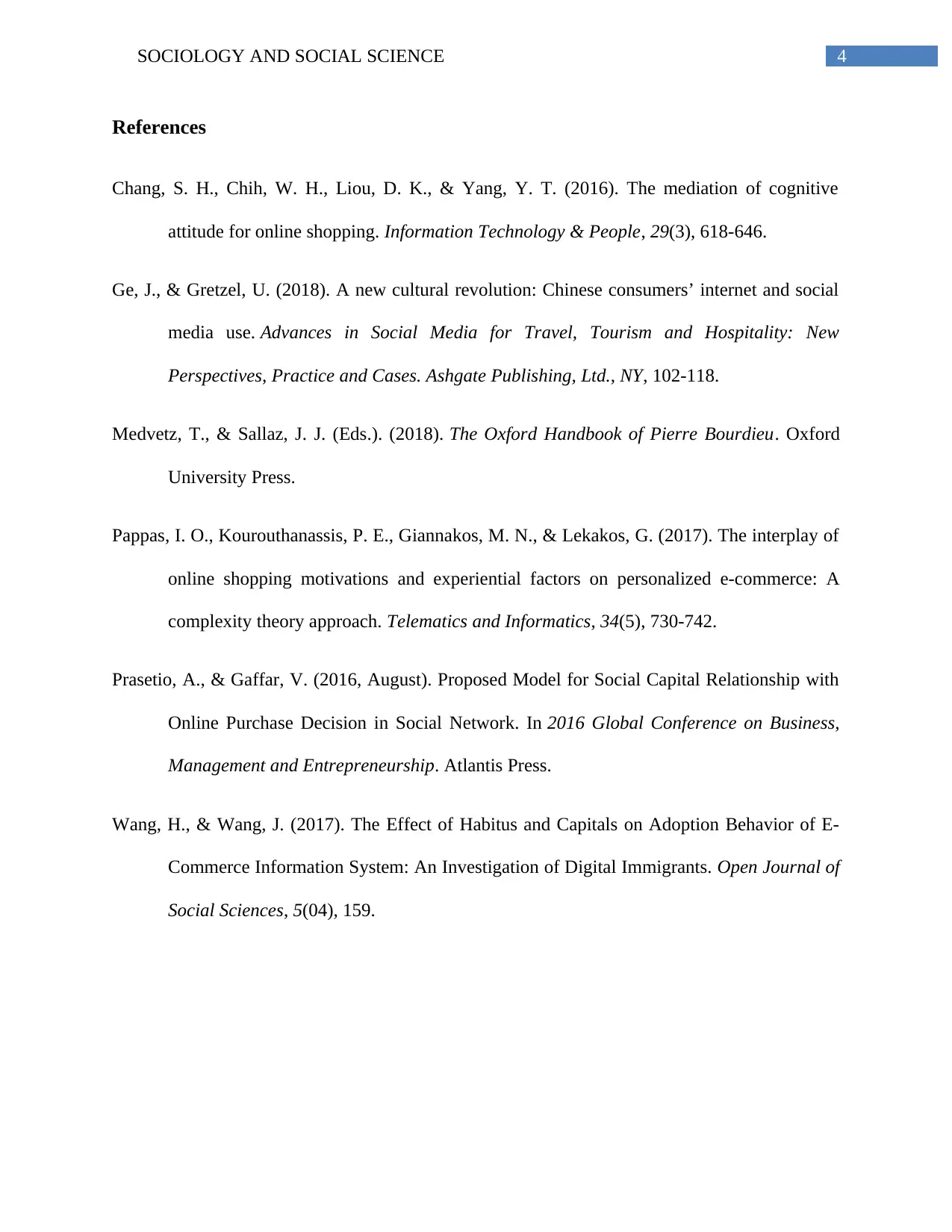
4SOCIOLOGY AND SOCIAL SCIENCE
References
Chang, S. H., Chih, W. H., Liou, D. K., & Yang, Y. T. (2016). The mediation of cognitive
attitude for online shopping. Information Technology & People, 29(3), 618-646.
Ge, J., & Gretzel, U. (2018). A new cultural revolution: Chinese consumers’ internet and social
media use. Advances in Social Media for Travel, Tourism and Hospitality: New
Perspectives, Practice and Cases. Ashgate Publishing, Ltd., NY, 102-118.
Medvetz, T., & Sallaz, J. J. (Eds.). (2018). The Oxford Handbook of Pierre Bourdieu. Oxford
University Press.
Pappas, I. O., Kourouthanassis, P. E., Giannakos, M. N., & Lekakos, G. (2017). The interplay of
online shopping motivations and experiential factors on personalized e-commerce: A
complexity theory approach. Telematics and Informatics, 34(5), 730-742.
Prasetio, A., & Gaffar, V. (2016, August). Proposed Model for Social Capital Relationship with
Online Purchase Decision in Social Network. In 2016 Global Conference on Business,
Management and Entrepreneurship. Atlantis Press.
Wang, H., & Wang, J. (2017). The Effect of Habitus and Capitals on Adoption Behavior of E-
Commerce Information System: An Investigation of Digital Immigrants. Open Journal of
Social Sciences, 5(04), 159.
References
Chang, S. H., Chih, W. H., Liou, D. K., & Yang, Y. T. (2016). The mediation of cognitive
attitude for online shopping. Information Technology & People, 29(3), 618-646.
Ge, J., & Gretzel, U. (2018). A new cultural revolution: Chinese consumers’ internet and social
media use. Advances in Social Media for Travel, Tourism and Hospitality: New
Perspectives, Practice and Cases. Ashgate Publishing, Ltd., NY, 102-118.
Medvetz, T., & Sallaz, J. J. (Eds.). (2018). The Oxford Handbook of Pierre Bourdieu. Oxford
University Press.
Pappas, I. O., Kourouthanassis, P. E., Giannakos, M. N., & Lekakos, G. (2017). The interplay of
online shopping motivations and experiential factors on personalized e-commerce: A
complexity theory approach. Telematics and Informatics, 34(5), 730-742.
Prasetio, A., & Gaffar, V. (2016, August). Proposed Model for Social Capital Relationship with
Online Purchase Decision in Social Network. In 2016 Global Conference on Business,
Management and Entrepreneurship. Atlantis Press.
Wang, H., & Wang, J. (2017). The Effect of Habitus and Capitals on Adoption Behavior of E-
Commerce Information System: An Investigation of Digital Immigrants. Open Journal of
Social Sciences, 5(04), 159.
1 out of 5
Related Documents
Your All-in-One AI-Powered Toolkit for Academic Success.
+13062052269
info@desklib.com
Available 24*7 on WhatsApp / Email
![[object Object]](/_next/static/media/star-bottom.7253800d.svg)
Unlock your academic potential
Copyright © 2020–2026 A2Z Services. All Rights Reserved. Developed and managed by ZUCOL.




